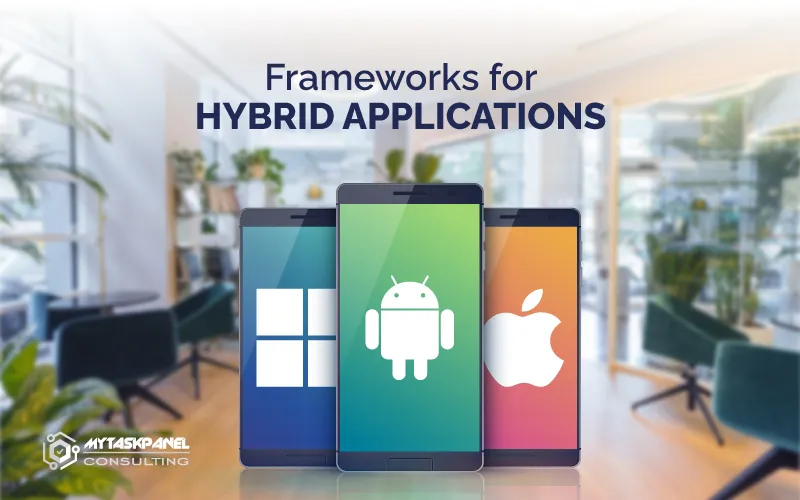FrameHworks for developing hybrid applications development frameworks allow you to create mobile apps that run on multiple platforms, using a single codebase. These frameworks combine elements of native apps and web apps to provide a native user experience and improve performance.
In this article, we will tell you what hybrid applications are and which are the most popular frameworks for this type of application.
What are hybrid apps?
Hybrid apps are mobile apps that combine elements of native apps and web apps. These apps use a hybrid development framework to create a native user interface and run code in a web container embedded in a native app.
Hybrid apps can access the native features of the device (sometimes requiring special libraries or including portions of native code to do so), such as the camera, GPS, and sensors. Also, they can take advantage of web applications, such as the ability to work on multiple platforms with a single code base. Some examples of hybrid apps include Instagram, Uber, and Airbnb.
The most popular frameworks for hybrid apps
There are several popular frameworks used for hybrid app development, which combine elements of native apps and web apps:
Ionic
Ionic is one of the most popular frameworks for fast and efficient development of hybrid mobile apps. It provides a number of pre-built UI components and tools, which make it easy to create attractive, native-looking interfaces.
In addition, Ionic offers a wide range of customizable UI components and built-in development tools, like the Ionic CLI, that make it easy to build, deploy, and test your apps with ease. It also includes a library of plugins that allow access to the native functions of the mobile device, such as the camera, GPS and push notification services.
React Native
React Native uses JavaScript and the popular React framework to build native user interfaces for iOS and Android. Unlike hybrid apps, it lets you build apps with real native components, giving you a performance and look that’s closer to native apps.
React Native is widely used in mobile app development as it offers a wide range of prebuilt components and an active community that contributes libraries and plugins. It also facilitates access to the native APIs of the device, through native modules or bridges.
Xamarin
With Xamarin, it is possible to develop cross-platform mobile applications, using the C# programming language. Its main advantage lies in the ability to build native mobile apps to ensure optimal performance and a native look and feel on every platform.
By using C#, developers can take advantage of the wide range of libraries and tools available in the .NET ecosystem. Xamarin also provides full access to native device APIs and features, allowing you to use sensors, cameras, GPS, and other platform-specific functionality.
PhoneGap
PhoneGap is a cross-platform mobile application development framework, based on web technologies such as HTML, CSS and JavaScript. Its structure allows developers to create attractive and interactive user interfaces. With PhoneGap, it is possible to add additional functionality, through custom plugins or from the community.
This framework uses Apache Cordova as the underlying framework and offers a wide range of plugins available that make it easy to access the native features of the mobile device, such as the camera, contacts, accelerometer and local storage. In addition, it has packaging and compilation tools to generate binaries ready for distribution in the different application stores.
Flutter
Flutter is a mobile and desktop application development framework, created by Google. It offers a complete development environment with tools such as Hot Reload, which allows rapid iteration and visualization of changes in real time. Also, it provides access to native features of the device through plugins and has a large community of developers and resources, which facilitates learning and support.
With Flutter, developers can build animated apps with a native user experience. The framework provides a wide range of customizable UI components and built-in developer tools to ease the mobile app development process. In addition, Flutter uses a proprietary rendering engine that facilitates fast performance and a smooth experience on mobile devices.
In conclusion, each framework has its own characteristics and advantages, and it is important to choose the right one based on the specific needs of the project. At MyTaskPanel Consulting we have the best specialists in all frameworks to develop hybrid applications.










